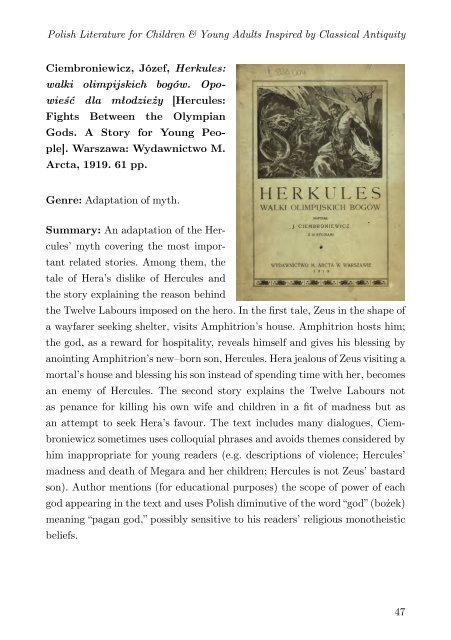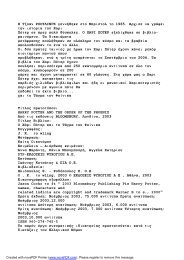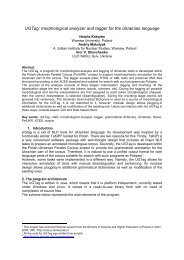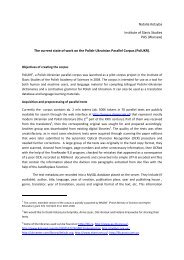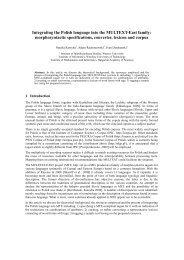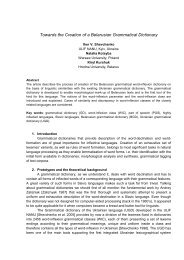- Page 1 and 2: Polish Literaturefor Children& Youn
- Page 4 and 5: Polish Literaturefor Children& Youn
- Page 6 and 7: Table of ContentsForeword . . . . .
- Page 8: Lucjan Rydel (1870-1918) . . . . .
- Page 11 and 12: Forewordchildren’s and adults’
- Page 13 and 14: Forewordsanctions, but out of share
- Page 15: ForewordIrezyona. Klechdy attyckie
- Page 19 and 20: List of ContributorsMarta AdamskaDo
- Page 21 and 22: [Anonymous][Anonymous], Mitologia [
- Page 24 and 25: Joe AlexCzarne okręty[The Black Sh
- Page 26 and 27: Polish Literature for Children & Yo
- Page 28: Polish Literature for Children & Yo
- Page 31 and 32: Adam BahdajAdam Bahdaj(1918-1985)A
- Page 33 and 34: Adam Bahdajfondness for ancient cul
- Page 35 and 36: Adam Bahdajmistook him for a poache
- Page 37 and 38: Irena BukowskaIrena Bukowska(1942-
- Page 39 and 40: Irena Bukowskato the shore and come
- Page 41 and 42: Henryk Jerzy ChmielewskiHenryk Jerz
- Page 43 and 44: Henryk Jerzy Chmielewskidescription
- Page 45 and 46: Henryk Jerzy ChmielewskiBibliograph
- Page 47: Józef CiembroniewiczJózef Ciembro
- Page 51 and 52: Dorota Combrzyńska-NogalaDorota Co
- Page 53 and 54: Dorota Combrzyńska-Nogalaunder 10
- Page 55 and 56: Iwona CzarkowskaIwona Czarkowska(19
- Page 57 and 58: Iwona CzarkowskaCzarkowska, Iwona,
- Page 60 and 61: Maria DynowskaZ podań greckich:
- Page 62 and 63: Polish Literature for Children & Yo
- Page 64 and 65: Polish Literature for Children & Yo
- Page 66 and 67: Wiktor GomulickiWspomnienia niebies
- Page 68 and 69: Polish Literature for Children & Yo
- Page 70 and 71: Andrzej Gordziejewicz-Gordziejewski
- Page 72: Polish Literature for Children & Yo
- Page 75 and 76: Marian GrześczakMarian Grześczak(
- Page 77 and 78: Marian GrześczakClassical themes:
- Page 79 and 80: JagminJagminPen-name of Maria Buyno
- Page 81 and 82: JagminBibliography:Arctowie, in: Ju
- Page 83 and 84: Jadwiga Jałowiec-BartczakJadwiga J
- Page 85 and 86: Jadwiga Jałowiec-BartczakJałowiec
- Page 88 and 89: HannaJanuszewska-MoszyńskaBajki o
- Page 90 and 91: Polish Literature for Children & Yo
- Page 92 and 93: Justyna JastrzębskaBogowie greccy
- Page 94 and 95: Polish Literature for Children & Yo
- Page 96 and 97: Zofia KaliskaNiezwykła podróż do
- Page 98 and 99:
Polish Literature for Children & Yo
- Page 100 and 101:
Maria KannNiebo herosów i bogów.
- Page 102 and 103:
Polish Literature for Children & Yo
- Page 104 and 105:
Grzegorz KasdepkeNajpiękniejsze mi
- Page 106 and 107:
Polish Literature for Children & Yo
- Page 108 and 109:
Polish Literature for Children & Yo
- Page 110 and 111:
Polish Literature for Children & Yo
- Page 112 and 113:
Ludwik Jerzy KernTu sa˛bajki[Here
- Page 114 and 115:
Polish Literature for Children & Yo
- Page 116 and 117:
Polish Literature for Children & Yo
- Page 118 and 119:
Polish Literature for Children & Yo
- Page 120 and 121:
Franciszek KobryńczukPoemat o kró
- Page 122 and 123:
Polish Literature for Children & Yo
- Page 124 and 125:
Polish Literature for Children & Yo
- Page 126:
Polish Literature for Children & Yo
- Page 129 and 130:
Anna M. KomornickaAnna M. Komornick
- Page 131 and 132:
Anna M. KomornickaKey words: Anagno
- Page 133 and 134:
Anna M. KomornickaKomornicka, Anna
- Page 135 and 136:
Anna M. Komornicka“You have conqu
- Page 137 and 138:
Maria KonopnickaMaria Konopnicka(18
- Page 139 and 140:
Maria Konopnickathe support of othe
- Page 141 and 142:
Bohdan KorewickiBohdan Korewicki(19
- Page 143 and 144:
Bohdan KorewickiKorewicki, Bohdan,
- Page 145 and 146:
Bohdan Korewicki1990, pp. 111-112.W
- Page 147 and 148:
Ignacy KrasickiIgnacy Krasicki(1735
- Page 149 and 150:
Ignacy KrasickiKadulska, Irena, Ign
- Page 151 and 152:
Krystyna KreyserKrystyna Kreyser(19
- Page 153 and 154:
Krystyna KreyserKey words: Greek my
- Page 155 and 156:
Maria KrügerMaria Krüger(1904-199
- Page 157 and 158:
Maria Krügerall. In exchange for t
- Page 159 and 160:
Maria KrügerClassical themes: This
- Page 161 and 162:
Maciej KuczyńskiMaciej Kuczyński(
- Page 163 and 164:
Maciej KuczyńskiBibliography:Macie
- Page 165 and 166:
Barbara LudwiczakBarbara Ludwiczak(
- Page 167 and 168:
Barbara LudwiczakKey words: Greek m
- Page 169 and 170:
Barbara LudwiczakCharybdis, Helios,
- Page 171 and 172:
Hanna ŁochockaHanna Łochocka(1913
- Page 174 and 175:
Andrzej MajewskiAdam niestrudzony w
- Page 176 and 177:
Polish Literature for Children & Yo
- Page 178 and 179:
Witold MakowieckiPrzygody Meliklesa
- Page 180 and 181:
Polish Literature for Children & Yo
- Page 182 and 183:
Polish Literature for Children & Yo
- Page 184:
Polish Literature for Children & Yo
- Page 187 and 188:
Kornel MakuszyńskiKornel Makuszyń
- Page 189 and 190:
Kornel MakuszyńskiMakuszyński, Ko
- Page 191 and 192:
Kornel MakuszyńskiMakuszyński Kor
- Page 193 and 194:
Wanda MarkowskaWanda Markowska(1912
- Page 195 and 196:
Wanda MarkowskaBibliography:Markows
- Page 198 and 199:
Adam MickiewiczBajki[Fables]
- Page 200 and 201:
Polish Literature for Children & Yo
- Page 202:
Polish Literature for Children & Yo
- Page 205 and 206:
Aleksander Wojciech MikołajczakAle
- Page 207 and 208:
Aleksander Wojciech MikołajczakThe
- Page 209 and 210:
Aleksander Wojciech MikołajczakThe
- Page 211 and 212:
Anna MilskaAnna Milska(1909-1987)A
- Page 214 and 215:
WojciechMohort-KopaczyńskiDawno te
- Page 216 and 217:
Polish Literature for Children & Yo
- Page 218 and 219:
Małgorzata MusierowiczJeżycjada[J
- Page 220 and 221:
Polish Literature for Children & Yo
- Page 222 and 223:
Polish Literature for Children & Yo
- Page 224 and 225:
Polish Literature for Children & Yo
- Page 226:
Polish Literature for Children & Yo
- Page 229 and 230:
Krystyna NepomuckaKrystyna Nepomuck
- Page 231 and 232:
Krystyna NepomuckaŻabelia and Lemu
- Page 233 and 234:
Edmund NiziurskiEdmund Niziurski(19
- Page 235 and 236:
Edmund Niziurskipupils, did not mee
- Page 237 and 238:
Ewa NowackaEwa Nowacka(1934-2011)A
- Page 239 and 240:
Ewa NowackaKey words: Egypt, Apis,
- Page 241 and 242:
Ewa NowackaNowacka, Ewa, Rogi Minot
- Page 244 and 245:
Katarzyna NowackaKról Zaczarowaneg
- Page 246 and 247:
Polish Literature for Children & Yo
- Page 248 and 249:
AgnieszkaNożyńska-DemianiukMity g
- Page 250 and 251:
Polish Literature for Children & Yo
- Page 252 and 253:
Jan OkszaOpowiadania o półbogach
- Page 254 and 255:
Polish Literature for Children & Yo
- Page 256:
Polish Literature for Children & Yo
- Page 259 and 260:
Elżbieta Olczak & Elżbieta Lubomi
- Page 261 and 262:
Elżbieta Olczak & Elżbieta Lubomi
- Page 264 and 265:
Stanisław PagaczewskiPrzygoda na R
- Page 266 and 267:
Polish Literature for Children & Yo
- Page 268:
Polish Literature for Children & Yo
- Page 271 and 272:
Irena ParandowskaIrena Parandowska(
- Page 273 and 274:
Irena ParandowskaBibliography:Paran
- Page 275 and 276:
Irena Parandowskadoes not recognize
- Page 277 and 278:
Jan ParandowskiJan Parandowski(1895
- Page 279 and 280:
Jan ParandowskiParandowski, Jan, Mi
- Page 281 and 282:
Jan ParandowskiParandowski, Jan, Wo
- Page 283 and 284:
Jan ParandowskiParandowski, Jan, Pr
- Page 285 and 286:
Jan ParandowskiSummary: First Olymp
- Page 287 and 288:
Jan ParandowskiParandowski, Jan, Z
- Page 289 and 290:
Eliza PiotrowskaEliza Piotrowska(19
- Page 291 and 292:
Eliza PiotrowskaClassical themes: T
- Page 294 and 295:
Anita RejchMity greckie. Baśnie st
- Page 296:
Polish Literature for Children & Yo
- Page 299 and 300:
Monika RekowskaMonika Rekowska(1967
- Page 301 and 302:
Monika Rekowskazakładano... [About
- Page 304 and 305:
Natalia RolleczekŚwietna i najświ
- Page 306 and 307:
Polish Literature for Children & Yo
- Page 308 and 309:
Polish Literature for Children & Yo
- Page 310 and 311:
Piotr RowickiMity greckie[Greek Myt
- Page 312 and 313:
Polish Literature for Children & Yo
- Page 314 and 315:
Halina RudnickaUczniowie Spartakusa
- Page 316 and 317:
Polish Literature for Children & Yo
- Page 318 and 319:
Polish Literature for Children & Yo
- Page 320 and 321:
Polish Literature for Children & Yo
- Page 322 and 323:
Polish Literature for Children & Yo
- Page 324:
Polish Literature for Children & Yo
- Page 327 and 328:
Mirosław RutkowskiMirosław Rutkow
- Page 329 and 330:
Mirosław RutkowskiBibliography:Rut
- Page 331 and 332:
Mirosław RutkowskiKey words: Greek
- Page 334 and 335:
Lucjan RydelFerenike i Pejsidoros[P
- Page 336 and 337:
Polish Literature for Children & Yo
- Page 338 and 339:
Wojciech RzehakMitologia. Wierzenia
- Page 340:
Polish Literature for Children & Yo
- Page 343 and 344:
Elżbieta SafarzyńskaElżbieta Saf
- Page 346 and 347:
Henryk SienkiewiczOrsoBaśnie i leg
- Page 348 and 349:
Polish Literature for Children & Yo
- Page 350 and 351:
Polish Literature for Children & Yo
- Page 352 and 353:
Polish Literature for Children & Yo
- Page 354:
Polish Literature for Children & Yo
- Page 357 and 358:
Stanisław SrokowskiStanisław Srok
- Page 359 and 360:
Stanisław SrokowskiDwa koguty [The
- Page 361 and 362:
Stanisław Srokowskiabout her own b
- Page 363 and 364:
Stanisław Srokowskihimself, he wen
- Page 365 and 366:
Stanisław SrokowskiBibliography:[T
- Page 367 and 368:
Stanisław Srokowski• Odysseus’
- Page 369 and 370:
Stanisław SrokowskiClassical theme
- Page 371 and 372:
Stanisław Srokowski9. the Girdle o
- Page 373 and 374:
Stanisław StabryłaStanisław Stab
- Page 375 and 376:
Stanisław StabryłaKey words: Gree
- Page 377 and 378:
Stanisław Stabryłathe Olympic or
- Page 379 and 380:
Marcin SzczygielskiMarcin Szczygiel
- Page 381 and 382:
Marcin Szczygielskithis word refers
- Page 383 and 384:
Dorota TerakowskaDorota Terakowska(
- Page 385 and 386:
Dorota TerakowskaKey words: Jesus C
- Page 387 and 388:
Jan TetterJan Tetter(1935- )A write
- Page 389 and 390:
Jan TetterClassical themes: Genealo
- Page 391 and 392:
Julian TuwimJulian Tuwim(1894-1953)
- Page 393 and 394:
Julian TuwimTuwim, Julian, Łacina
- Page 396 and 397:
Krzysztof UlanowskiMitologia[Mythol
- Page 398:
Polish Literature for Children & Yo
- Page 401 and 402:
Alicja Wach-BrzezińskaAlicja Wach-
- Page 404 and 405:
Monika WarneńskaSpotkamy się na A
- Page 406 and 407:
Polish Literature for Children & Yo
- Page 408:
Polish Literature for Children & Yo
- Page 411 and 412:
Aleksandra WitkowskaAleksandra Witk
- Page 413 and 414:
Aleksandra WitkowskaWitkowska, Alek
- Page 416 and 417:
Władysław ZambrzyckiNasza Pani Ra
- Page 418 and 419:
Polish Literature for Children & Yo
- Page 420 and 421:
Tadeusz ZielińskiIrezyona. Klechdy
- Page 422 and 423:
Polish Literature for Children & Yo
- Page 424 and 425:
Polish Literature for Children & Yo
- Page 426 and 427:
Polish Literature for Children & Yo
- Page 428 and 429:
Polish Literature for Children & Yo
- Page 430 and 431:
Albert ZipperOpowiadania z mitologi
- Page 432 and 433:
Polish Literature for Children & Yo
- Page 434 and 435:
Jadwiga ŻylińskaMistrz Dedal[Mast
- Page 436 and 437:
Polish Literature for Children & Yo
- Page 438 and 439:
Polish Literature for Children & Yo
- Page 440 and 441:
Polish Literature for Children & Yo
- Page 442 and 443:
Polish Literature for Children & Yo
- Page 444 and 445:
Polish Literature for Children & Yo
- Page 446:
We have here a truly exceptional pr


